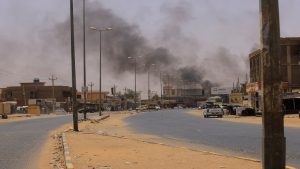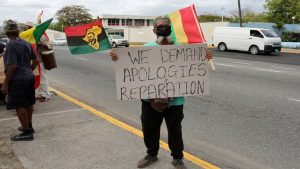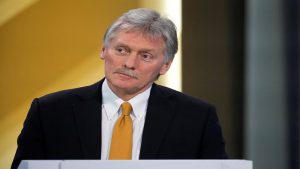Senior Research at Fellow Africa Asia Dialogues Thembisa Fakude says the conflict between Russia and Ukraine is likely to affect Africa in many ways, particularly the economy.
He says when there has been a conflict in the past, oil-producing countries tend to redirect their products to Europe.
Fakude’s remarks follow the Russian government’s invasion of Ukraine which has put many in a vulnerable position.
Fakude says the conflict will affect Africa in terms of oil supply. On Friday, for the first time in seven years, a barrel of crude oil passed the $100 mark – indicating tough times ahead for African countries.
Below is the full interview with Thembisa Fakude:
Fakude says it is important for African countries to take a position in the matter at hand.
So far, the United States, Britain, Canada, the European Union, Australia, Japan and Taiwan are among the growing list of countries that have imposed sanctions on Russia.
He says although South Africa and Kenya had issued separate statements condemning what is happening in Ukraine, it seems South Africa is on a fence regarding the situation between Russia and Ukraine.
“However, they will be forced at some point to come up with a position condemning what’s happening there because the entire Europe and the United States have condemned the attacks by Russia,” says Fakude.
Fakude says President Cyril Ramaphosa has been leaning towards aligning his politics and South Africa with the European countries.
He says Brand South Africa is going to be impacted if government continues to associate itself with BRICS.
“South Africa is in coalition with these four leaders in BRICS and it’s going to certainly affect South Africa’s image if he continues to associate with these leaders who are suppressing freedom and going against the human principles,” says Fakude.
Comparing Kenya and South Africa’s statement on the Russia-Ukraine crisis, he says the African continent is divided on the matter. Fakude says both statements are totally opposite.
Kenya’s representative to the United Nations (UN) on Monday condemned the Russia-Ukraine crisis, comparing it to colonialism in Africa.
The Kenyan Ambassador was quoted in the United Nations Security Council as saying: “… Kenya rejects such a yeaning from being pursued by force. We must complete our recovery from the embers of dead empires, in a way that does not plunge us back into new forms of domination and oppression. We reject expansionism on any basis that includes racial, ethnic or cultural factors. We rejected it again today. Kenya registers its strong concern and opposition to the recognition of the independent states. We further strongly condemn the trend in the last few decades a powerful states, including members of the security council, reaching international law with little regard.”
Most nationalism lies on its deathbed tonight. It has been assaulted today as it has been by other states in the recent past. We call on all members to rally behind the Secretary-General and ask him to rally us all to the standard that defines multilateralism. We also call on him to bring his good officers to bear to help the concerned parties to help resolve this situation by peaceful means. Let me conclude Mr President by reaffirming Kenya’s respect for the territorial integrity of Ukraine within its internationally recognised borders.”
Never thought I would be quoting the UN Security Council at a moment like this, with both Russia and United States still holding veto power. However Kenya’s Ambassador speech, standing in solidarity with Ukraine, needs to be heard. Diplomacy speaking loud. pic.twitter.com/tYgp2qfVVJ
— Dr. Jennifer Cassidy ?? (@OxfordDiplomat) February 22, 2022
South Africa’s Minister of International Relations and Cooperation, Naledi Pandor, said South Africa is monitoring the situation.
“It’s true that women are often excluded when we are in the post-conflict phase and particularly during negotiations and in the process of transition to a new democracy. Everybody is talking about Ukraine and we have tressed South Africa’s approach, that we should always seek diplomatic solutions. We should always strive for a negotiated outcome and we should not resort to arms. This is the message that I have been conveying to my colleagues asking what South Africa’s opinion on Russia and Ukraine. Don’t stop talking, draw the leaders together, draw the different parties together, look for a way of addressing this imminent crisis and really reduce the tone of hostility that is in many of the statements that have been made. We are hopeful that the leaders involved will strive to find a resolution that doesn’t result in the breakout of conflict.”
Fakude added that Africa tends to have one position which is often dictated by the African Union resulting in countries not taking an independent position.
“I think what’s going to happen this time around, we will have independent countries uttering different independent positions and you are likely to have many countries siding with Europe and some will side with China and Russia because both nations are big trading partners in Africa,” says Fakude.






